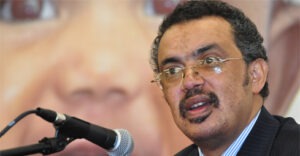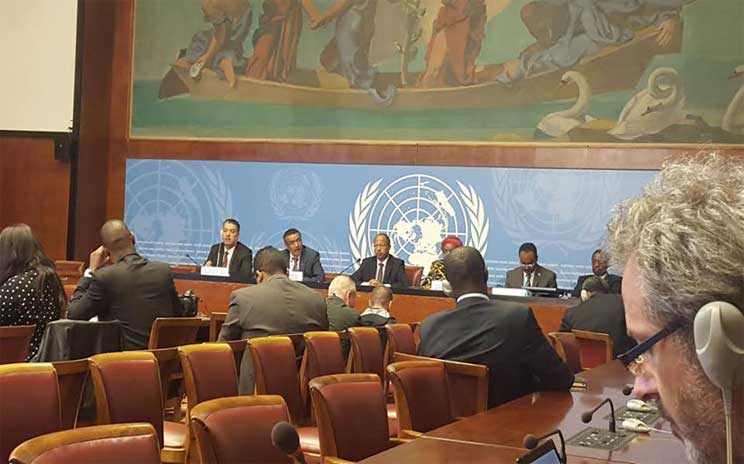ADDIS ABABA (HAN) May 25.2016. Public Diplomacy & Regional Security News. Dr. Tedros Adhanom, Ethiopia’s Minister of Foreign Affairs and former Minister of Health, formally announced his candidacy for Director-General of the World Health Organization at a press conference at the United Nations on Tuesday (May 24, 2016). He was joined by Ethiopian Minister of Health Dr. Kesetebirhan Admasu, African Union Commission Chairperson Dr. Nkosazana Clarice Dlamini-Zuma, and Algerian Health Minister Mr. Abdelmalek Boudiaf. Dr. Tedros is recognized worldwide as an experienced, collaborative, and diplomatic leader whose reform programs within Ethiopia and at the head of global health organizations achieved significant impact. He received the unanimous endorsement of the African Union to be the next Director-General.
On the occasion, Dr. Tedros touched upon why he is running for the post of Director- Generalship of WHO, his visions for change and the way ahead. He said, “This is an amazing time in global health. When we look around the world, we see incredible successes. We have made huge progress in improving health outcomes and making significant health advances in people’s lives, in part thanks to the tireless work of those at WHO and of health officials across the globe. Yet, as we all know, there are still challenges. And many will tell you some of these challenges extend to WHO. I am here to tell you these are not challenges. These are opportunities for us to work together for a healthier world.
Dr. Tedros mentioned Ethiopia’s experience and the success stories he has overseen as Minister of Health. He said, “When I was Ethiopia’s health minister, as you know, we made great strides in a very short time. Our country faced extraordinary challenges. Maternal mortality and child mortality rates were incredibly high, as were instances of diseases like malaria, tuberculosis, and HIV. Families lacked access to life-saving vaccines and medicines, and for far too many people, access to basic health care required walking for days to one of the few health centers in the country.”
Accordingly, he said “So first, we took an honest look at the state of our health care system. Second, we put together a realistic plan rooted in research and data. And third, we built the partnerships we knew we needed to carry out our ambitious goals. And then, we took on the things that would have the most substantial health impact for our people.The reform agenda we had was very omprehensive, including service delivery, workforce, the health information system, access to drugs, health financing, and health insurance. Almost all of the blocks of the health system were touched.”
And as a result, he added maternal mortality rate was slashed by 69 percent, and infant mortality by two-thirds, and there was a significant reduction in the prevalence of HIV, malaria, and TB. In all these, Dr. Tedros however noted that he has had not only a national experience but also a global one.
He said, “I led the Global Fund during its transition. As you know, we reformed the Global Fund, together with the board members, to address the challenges that it had. And I also chaired the UNAIDS Board, the Roll Back Malaria Board, and the Board of the Partnership for Maternal, Newborn and Child Health, and I have played a leadership role in other global health institutions. I believe my national and international experience will be an advantage in implementing reform, especially at the WHO level. Not only that, along with my experience, I bring a fresh view. Global health has been seen in the past from the rest of the world’s perspective only. But as you know, Africa and many of the developing countries carry most of the burden.”
On the need to give the chance to Africa and envision global health from an African perspective, Dr. Tedros said, “We have never given a chance to Africa and developing countries so we can see global health from that perspective and see global health from those who can understand the causes of many global health problems—and contribute not only to Africa and developing countries but also contribute to the rest of the world by focusing on the root causes of many of the challenges that we face. The fresh view we can bring from our continent and the perspective of a developing country can help improve the global health situation.”
Dr. Tedros pointed out his three key priorities that he will address as a WHO Director-General.First, he said he would work to ensure that everyone in the world—regardless of who they are, or where they live—has access to basic health care, noting that health issues are a rights issue, and an end in itself, which he called the two basic twin goals. This will be done in part by working with regions to create blueprints to meet the Sustainable Development Goals, which provide a global mandate to achieve universal health coverage and provide access to safe and effective medicines and vaccines for all.
Secondly, he said he would focus on strengthening emergency preparedness and response. He said, “Shutting down airports, canceling flights, and holding people hostage in quarantine is not an effective way of addressing epidemics. We cannot truly be prepared for emergencies without building the underlying health systems to detect—and prevent—these crises before they spread. And to implement the International Health regulation in its totality, in a comprehensive way.”
Third, Dr. Tedros said he would emphasize policies that improve the lives and health of women and girls. Women are the backbone of society—yet in too many cases, they remain the most underserved by our policies. He said, “If we’re going to improve the lives of all people, we have a clear responsibility to champion the rights of girls and women, and put them at the center of all the programs.”But we cannot do all this alone,” he said, taking note that he would also focus on improving our funding structure and forging strong partnerships with organizations that share a common goal.
Dr. Tedros finally said, “WHO cannot be everywhere at every moment. It does not have the financial resources to enact all the programs necessary to address our world’s most pressing issues. We can no longer afford to see impactful global organisations with a common cause as competitors; nor can we afford to continue taking funds that are earmarked for projects that do not achieve our broader goals. So WHO, in order to address all these health issues, should lead from center and front by building genuine and effective partnerships.This is about people. It’s time for change. It’s time for a Director-General who has lived some of the most pressing challenges facing our word today, as I have lived in Africa. It’s time to make the next leap forward to ensure that no matter who you are, or where you are, or what you look like, you have the right to lead a healthy life.”

Leave a Reply